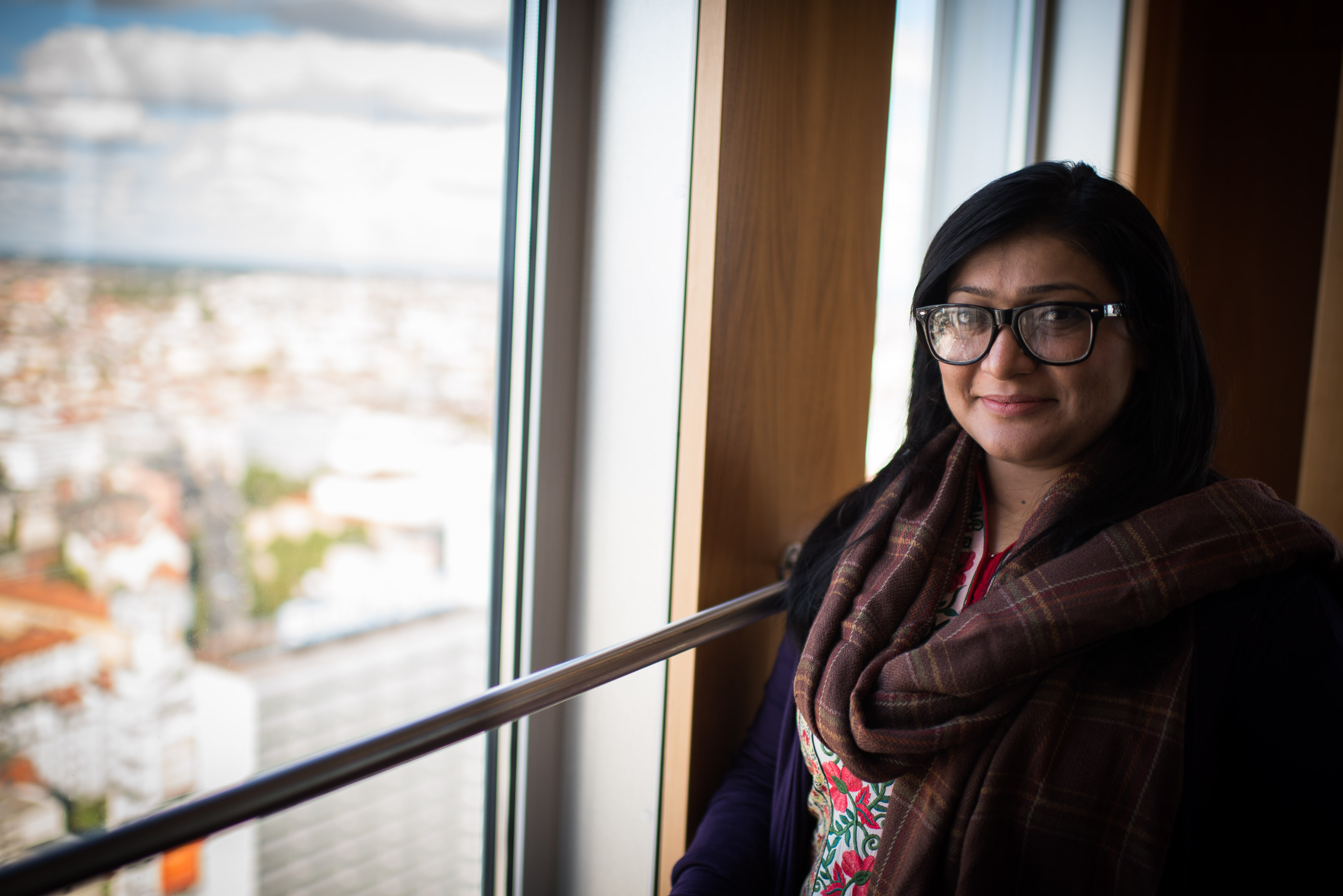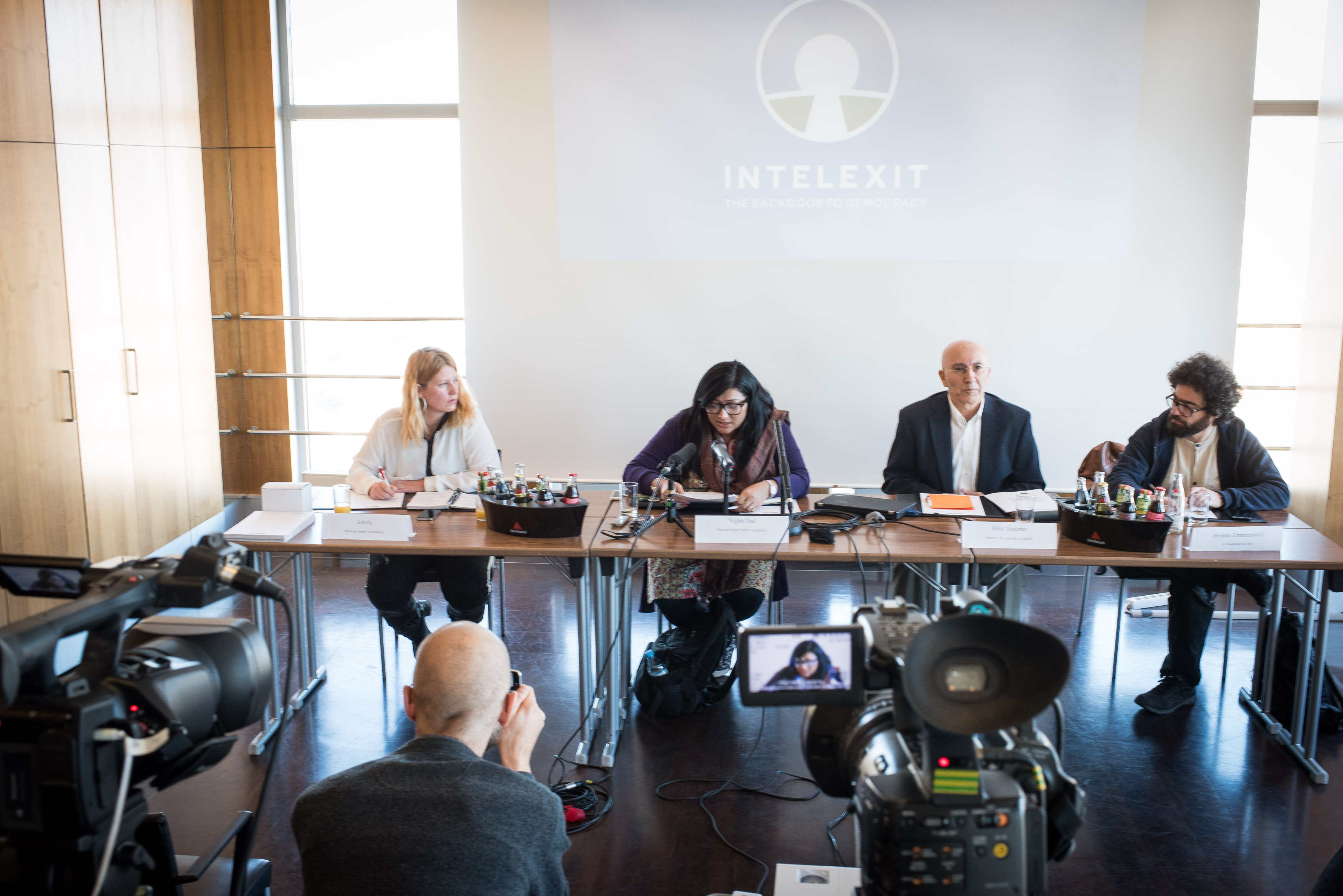One of the guest speakers at the recent Intelexit press conference was Nighat Dad, a digital rights activist from Pakistan. She gave an emotional speech about the effects of the drone war on the daily lives of Pakistani citizens and appealed to intelligence agency personnel to resign. We talked to her afterwards about her work at the Digital Rights Foundation, mass surveillance in Pakistan and the involvement of the German government in the drone attacks.

Nighat Dad is the founder of Digital Rights Foundation Pakistan and its Executive Director. She has been named a „Next Generation Leader“ by the TIME magazine in 2015 for her work against online harassment of Pakistani women.
Es gibt auch eine deutsche Übersetzung dieses Interviews. There is also a german translation available.
What is the Digital Rights Foundation currently working on?
Nighat Dad: At the moment we’re working on an anti-surveillance campaign focusing on NSA’s intrusion in Pakistani space after Snowden’s revelations showed that the NSA surveilled 55 million Pakistani mobile users.
We are also looking into the Pakistani intelligence agency which is surveilling citizens, the judiciary, and politicians without having any accountability and transparency in the whole process. We are making the government accountable for their actions by reaching out to senators and parliamentarians. There is not so much awareness and education about surveillance in Pakistan, so people and politicians often think surveillance is part of the normal job being done by the intelligence agencies. Nobody questions them. However, the Snowden revelations led to a huge debate in Pakistan as well. Senators and parliamentarians are also raising this issue in their chambers now.
We also organize digital security trainings for journalists, activists, and civil society organizations because people are now more tend to use internet for their work. They use it without having any knowledge about security and safety in the online space. We are telling them about surveillance, how they are being monitored, what steps they can take to avoid surveillance and other digital security issues.
You are a trained lawyer with a focus on legislations and policies concerning women’s rights. What challenges and problems are Pakistani girls and women facing in the Internet?
Nighat Dad: At the moment we do not have any cybercrime legislation or any law which actually gives safeguards to the women who are facing harassment, for example rape threats or whose freedom of expression is violated by their harassers.
Firstly, women often don’t know about the legal remedy or any laws and policies which actually give them any safeguards. Secondly, they absolutely have no idea what to do in case of harassment or how to avoid it.
So you’re providing them with trainings?
Nighat Dad: Yes, we have started a massive training program in universities and colleges where we talk to young women. More and more women are using mobile phones in Pakistan because it is becoming more acceptable to their family members. Fathers and brothers usually didn’t allow women to have mobile phones due to cultural factors. I remember that when I was in university, I was not allowed to have a mobile phone. So it’s a real challenge for these women to have access to these technologies. Also, in a case of harassment they cannot simply tell their families about it. They don’t know how to deal with these situations.
Are you teaching encryption techniques in your seminars?
Nighat Dad: Encryption is actually illegal in Pakistan. The laws say that if you have to use encryption, you have to get permission from the Pakistan Telecommunication Authority (PTA) first, which actually does not make sense to me. I do not know about any public cases where people got into trouble because they used encryption but the ISPs are told by the PTA to monitor those who are encrypting.
Has anyone ever been charged with using encryption?
Nighat Dad: I do not know about any public cases where people got into trouble because they used encryption but the ISPs are told by the PTA to monitor those who are encrypting.
So how are you dealing with this situation in your daily work?
Nighat Dad: Sometimes I just start to use encryption when I feel like I need to secure my communications or when I feel endangered … There is this draconian cybercrime legislation right now which violates some of the fundamental freedoms enshrined in our constitution. There are a few activists in Pakistan who are at the forefront, including me, and I feel like I am being surveilled and I am being targeted. For example, whenever I talk about this cybercrime legislation on Twitter, there is this twitter troll army ready to attack me. These days I feel like I am actually monitored and I know that it is illegal so I am not using it [encryption] right now.
As far as I have heard, there are new plans by the Pakistani government on expanding the surveillance by the intelligence services. What’s the current status?
Nighat Dad: Yes, that’s right. Privacy International released a report about a month ago showing that the Pakistani intelligency agency is planning to replicate the programs of the NSA. Not only restricted to the Pakistani internet users but also outside the borders of Pakistan. This is a major plan that also requires a lot of money. The released documents show that these plans are dating back to 2013. I believe that they are implemented right know.
Is there a discussion in Pakistan about this?
Nighat Dad: Gladly, not only civil society is raising these issues but also one of the Senators addressed this recently. He issued a motion, demanding that the government questions the intelligence agencies about these plans. All around the world intelligence agencies are beyond legislative control and liabilities, in Pakistan as well. I think now is the time where they should be hold accountable, whatever they are doing.
We know from the Snowden revelations that Metadata is used to determine targets for drone attacks. How does that work?
Nighat Dad: It is already revealed by Snowden that for the drone attacks the most common tactic by the NSA is „geolocation“ which involves locking of the sim card or mobile handset of a target. Former drone pilot Brandon Bryant also mentions clearly how metadata is used in drone strikes and how erroneousness in this method has killed thousands of civilians. The NSA has no mechanism to verify its targets which often results in the killing of innocent people.
They have also identified some characteristics like a gathering of three to four men having beards. For example in 2011, there was this tribal gathering, a Jirga, with more than a hundred elders in a tribal area (Waziristan) where most of the drone attacks happen and they were discussing local village issues. They were attacked by drones because some of the men had beards and 44 elders got killed. This shows how characteristics and metadata are used to target people.
Is this the reason why you were one of the speakers at the press conference of the intelexit campaign today?
Nighat Dad: Yes, because the secretive business of these intelligence agencies and governments is becoming more and more common. They don’t want be held accountable. In Germany for example: No one is questioning them hard enough why they are providing an air base for the drone attacks by the US.

When I come to Berlin, I feel like there is a lot of freedom here. Berlin has raised the issue of surveillance in the past and has set a very good precedence for the governments as well to question the NSA but at the same time they’re allowing a base for operating drone attacks.
So you think that the German government has an obligation to change something?
Nighat Dad: Absolutely, why not? The media here should pressure the German government more heavily to provide justification for why they are providing the Ramstein base. Why are innocent Pakistanis killed with drones being operated from Germany? These are the questions that should be raised! We should hold them accountable!
What would you like to tell those people working for the intelligence agencies?
Nighat Dad: I think they should know that the drone attacks that are happening are not a videogame but that real people, real human beings are killed. Those who are dead are dead! Those who survive are disabled, they are crippled. These victims just do not get any remedy from anywhere.
The drone attacks are impacting communities since children cannot go out and play, they cannot access schools. Mothers and fathers are scared to send their kids out of the house, people cannot gather in a wedding, they cannot go to a funeral or hold tribal gatherings because they are easily targeted by drones. People in those agencies should be aware that they have blood on their hands
What do you think about the Intelexit campaign?
Nighat Dad: I think it is a very good campaign as it paves a way for those agents to get out of this bloody business. It would be great if they see that their “small” actions have a real impact on the communities and lives of people in Pakistan. If they have a heart and a brain, they will definitely use this opportunity to get out of these agencies.




The German government should shut down Ramstein. No doubt about that. But I think the bigger problem here is the government of Pakistan. Remember, the Pakistani intelligence agency (and the government) cooperates with CIA/NSA authorizing all (or most of the) drone attacks. So yes, we (the German government) can change something and we should do more for the Pakistani citizens. But it is up to their administration to fully end this attacks against their own people.